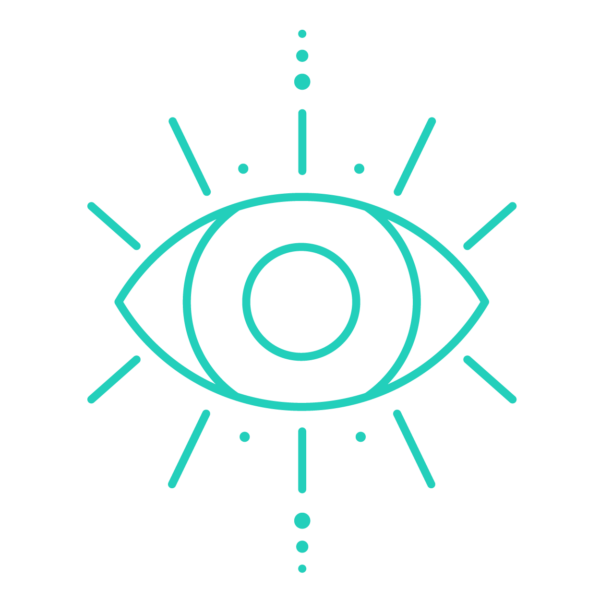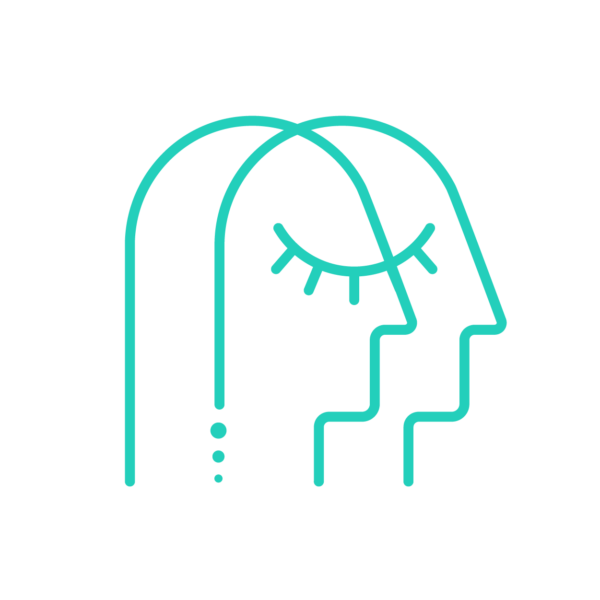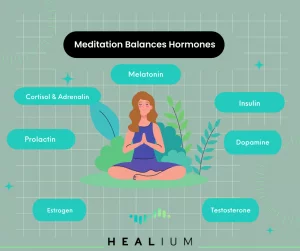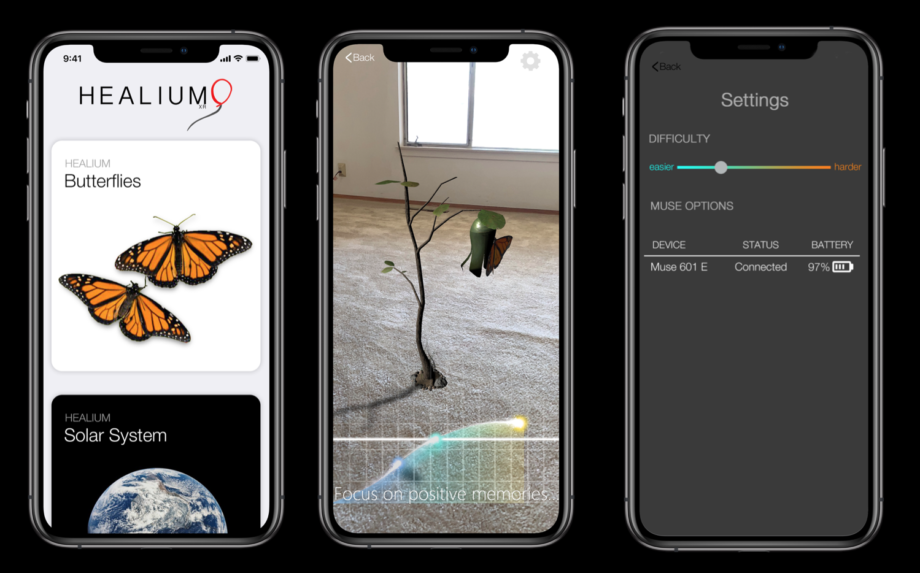




Jump to: Mental Resilience Training | How Healium Works | The Science Behind Healium | Anxiety | Mood | Positivity
Arlington County Police Department Pioneers New Officer Wellness Tools
Less than 20% of police officers seek help for mental health concerns according to a recent article from Walden University.
Law enforcement officers routinely face high-pressured situations that require sound decision making. When you’re stressed, that decreases working memory which increases the likelihood of errors. Whether you’re a police officer, a nurse, or a pilot, these “worker athletes” benefit from drugless solutions to boost their human performance.
 According to the American Police Officers Alliance, alcohol abuse, depression, post-traumatic stress disorder (PTSD), and suicidal thoughts are common mental concerns for officers around the US. In fact, 1 in 4 officers contemplate suicide.
According to the American Police Officers Alliance, alcohol abuse, depression, post-traumatic stress disorder (PTSD), and suicidal thoughts are common mental concerns for officers around the US. In fact, 1 in 4 officers contemplate suicide.
Departments are finding new, engaging ways to improve mental fitness within their own teams. Emerging tactics include destigmatizing seeking help, centralizing resources internally and forming strategic partnerships with health organizations. The Arlington County Police Department has also introduced immersive media for mental resilience training and recovery. Recently, the ACPD launched a wellness initiative for officers through a partnership with Cummings Foundation Behavioral Health.
The new initiative introduces Virtual Reality Stress Management Training using Healium’s software. The officers are using VR headsets to interrupt the stress response, provide vi
rtual nature experiences, and create stored memories that can be recalled in stressful situations.
Five peer-reviewed journal publications show Healium’s impact on anxiety, positivity, and mood improvement. Officers will be able to experience calm in as little as four minutes through these virtual nature escapes that have the option of being powered by wearables that allow the user to see their own brain patterns or heart rate inside virtual worlds.

For more information on virtual reality as a drugless non- harmful coping mechanism for you or your team, visit tryhealium.com.
While you’ve probably heard that meditation is a good practice, many people still don’t know why or how exactly it is beneficial. Meditation has the power to positively reshape the structure of our brains!
If you are curious about meditation, but find yourself routinely asking, “Why should I meditate?” this article is for you.
We’ll discuss the different long-term effects of meditation and how exactly these effects operate, as illustrated in research.
 Your brain is an incredible organ, capable of affecting much more than the muscles throughout your body. In fact, the biochemical makeup of your brain may have an even larger impact on your body’s functioning at large.
Your brain is an incredible organ, capable of affecting much more than the muscles throughout your body. In fact, the biochemical makeup of your brain may have an even larger impact on your body’s functioning at large.
That’s why it’s so important to strive for mental fitness, which is a mindset where you treat your brain like the muscle it truly is. This means exercising it regularly through the likes of meditation and neurofeedback so you maintain a proper balance of hormones & optimize your brainwaves.
– Cortisol & Adrenaline
Cortisol and adrenaline are both stress hormones, designed to put your body in tense “flight or fight” mode. When adrenaline is present in higher levels, your blood pressure rises along with your heart rate. Meanwhile, cortisol works to suppress your digestive system and increase your blood sugars.
While there’s certainly a time and place for these specific hormones, balancing their levels during the more normal periods of your day has become more important than ever. Stress at large has become the 21st century epidemic, estimated to be responsible for around 90% of all doctor’s visits.
Mindfulness exercises like meditation have been proven effective at lowering the levels of these hormones and eliminating stress from your life.
– Melatonin
Melatonin is the hormone responsible for keeping our sleep-wake cycles in check and regulating our body’s internal clock. The more melatonin our body produces, the easier it becomes for us to sleep.
Studies suggest that meditation may help increase our melatonin levels. This falls in line with previous research that indicates meditation helps improve sleep issues and reduce insomnia symptoms.
– Insulin
Researchers have noted that regular meditation positively affects risk factors for diabetes mellitus. In a 2006 study, regular transcendental meditation improved the blood pressure and insulin resistance of the patients.
Moreover, the lowered cortisol levels that regular meditation practice brings also allows the insulin in our bodies to work properly.
– Prolactin
Prolactin is another hormone our body produces more whenever we are exposed to stress. At high levels, it can potentially disrupt estrogen and progesterone balance, which in turn can affect our emotional regulation.
By improving our stress levels and responses, practicing meditation can help down-regulate prolactin production. In turn, this may help prevent infertility, acne, and irregular menstruation.
– Dopamine
Research findings suggest that meditation techniques raise our dopamine levels. Getting a surge of dopamine helps improve our memory, focus, and problem-solving capabilities.
Dopamine is one of the “happy hormones” our body releases when we exercise. It causes feelings of pleasure, motivation, and satisfaction. It essentially primes our brains for peak performance.
– Estrogen & Testosterone
Chronic stress and lack of sleep can suppress women’s estrogen levels and adversely influence men’s testosterone release. As such, regular meditation, which reduces stress and anxiety, can aid in raising estrogen and testosterone levels.
Moreover, studies indicated that practicing meditation may boost the production of DHEA or dehydroepiandrosterone. Aside from being an “anti-aging” hormone, DHEA helps produce other vital hormones, including estrogen and testosterone.

One popular benefit of meditation is reducing stress. In particular, a 2013 study noted that mindfulness meditation can help lower cortisol levels. As the main stress hormone in your body, cortisol works with several parts of your body to regulate your mood.
Research has also shown that meditation can help relieve stress as participants experience structural changes in their amygdala. This structure of cells lying in the middle of the brain are the ones responsible for stress, anxiety, and fear.
Meditation is referred to as a mind-body complementary medicine too. It allows you to experience a deep relaxation state and peace of mind. This is because when you meditate, you’re able to remove different conflicting thoughts that keep you preoccupied and give you stress and anxiety.
As a result, meditation can help you improve both your physical and emotional wellness.
In another study conducted in 2014, transcendental meditation, wherein you need to quietly repeat either a sound or word to help you remain focused, has been shown to help reduce teachers’ stress and burnout. By utilizing stress scales before and after the transcendental meditation program, the researchers found out that participants had lower stress levels and burnout.

According to the Centers for Disease Control and Prevention (CDC), around 70 million people in the U.S deal with chronic sleep problems.
So, if you’re wondering “why meditate?” it’s because the practice can help improve your sleep quality.
A 2015 study from JAMA Internal Medicine examined the effect of mindfulness meditation on 49 adults experiencing moderate sleep problems. Results revealed that the participants who practiced meditation had fewer symptoms of insomnia.
They also experienced less daytime fatigue. While sleep-related problems are often caused by worries and stress, researchers noted that meditation can enhance your relaxation response. Moreover, the practice facilitates better control of the autonomic nervous system. As a result, your tendency to be awakened quickly is mitigated.
Meditation improves levels of melatonin too, which has a crucial role in regulating sleep. In particular, slowing hepatic metabolism or amplifying synthesis in the pineal gland makes the increase of melatonin concentration possible. Then, meditation techniques can manage the blood flow of the brain’s executive regions during sleep. Given that meditation practices influence several brain functions positively, it creates mind and body harmony.
At Healium, we’ve developed an application specifically catered to improve your sleep quality through meditation. By combining virtual reality, neurofeedback devices, and sleep meditation experiences, Sleepium provides users with an actionable means to achieve better sleep.
Long-term effects of meditation include managing age-related memory loss too. For example, a meditation technique called Kirtan Kriyas has been shown to help improve the memory of individuals experiencing cognitive decline. Various meditation styles may also enhance the memory and attention of older adults.
Even people dealing with dementia can benefit from meditation’s ability to provide partial improvement of memory. At the same time, the family members who take care of individuals with dementia can manage their stress and cope more effectively through meditation.
A 2017 study on adults experiencing early memory loss reported that meditation practices, along with listening to music, can provide several benefits. These include boosting cognition, enhancing mood and the quality of life, and helping reverse memory loss in older adults suffering from subjective cognitive decline.
Practicing mindfulness meditation may also help you develop a better perception of life. A review on meditation programs, for instance, noted that meditation helps improve symptoms of depression among over 3,000 adults.
A study published in the Journal of Research in Personality emphasized that meditation exercises may mitigate the presence of negative thoughts. Meanwhile, another review noted the potential of meditation to combat depression by reducing cytokine levels. When you’re stressed, your body releases these inflammatory chemicals that may affect your mood and develop into anxiety and depression.
Meditation can help people combat addiction. For example, a 2013 review highlighted that mindfulness-based interventions can significantly lower the consumption of alcohol, cigarettes, cocaine, and other substances. The same review noted other studies that suggest the link between these interventions and reduced cravings.
Another 2014 study reported that meditation can mitigate the risk of substance abuse relapse. It supports your ability to fight the discomfort related to drug cravings and other negative effects, which means that long-term outcomes can be expected.
Given the mental discipline that you acquire from meditation, you can have more self-control. In turn, you become more aware of the things that trigger your addictive behaviors. With meditation, you can control your impulses and emotions better as well as redirect your focus, thus helping combat addiction.
A study conducted in 2018 also focused on the effect of transcendental meditation on individuals treated for alcohol use disorder. Results showed that this practice may help reduce alcohol use, alcohol cravings, and psychological distress.

Meditation practices have been around for thousands of years, and for good reason. While the mysteries of the brain are still being unraveled, there is solid scientific evidence reinforcing the long term benefits of meditation for your mental fitness and overall health of your brain.
These benefits include relieved stress levels, enhanced quality of sleep, improved age-related memory loss, better emotional health and empathy levels, and even help in combating addiction.
What’s more? The advances in modern technology are even further capitalizing on these benefits!
If you want to take your meditation experience to another level, find out how new technologies like virtual reality meditations even further enhance this millenia old practice.
 When supplemented with additional neurofeedback equipment, modern day virtual reality meditation has the power to optimize specific brainwaves, reduce stress, and increase your mental fitness as a whole. You can finally remove the mystery from meditation and track the improvements it’s making to your brain.
When supplemented with additional neurofeedback equipment, modern day virtual reality meditation has the power to optimize specific brainwaves, reduce stress, and increase your mental fitness as a whole. You can finally remove the mystery from meditation and track the improvements it’s making to your brain.
{“@context”:”https://schema.org”,”@type”:”FAQPage”,”mainEntity”:[{“@type”:”Question”,”name”:”Why Should You Meditate?”,”acceptedAnswer”:{“@type”:”Answer”,”text”:”Meditation is a highly successful, non-invasive and drugless alternative to traditional medicines that helps with a number of health issues including: stress and anxiety, balancing your hormones, sleep deprivation, memory loss, managing emotions and addiction.”}},{“@type”:”Question”,”name”:”Why Meditate Every Day?”,”acceptedAnswer”:{“@type”:”Answer”,”text”:”The benefits of meditation are felt the most when practicing a steady and consistent meditation routine. As you become more consistent with your practice, your brainwaves actually alter and your brain more easily reaches the flow state.”}},{“@type”:”Question”,”name”:”Should You Think When You Meditate?”,”acceptedAnswer”:{“@type”:”Answer”,”text”:”You will never be able to truly turn your brain off, which means you will undoubtedly stumble across random thoughts when you meditate. Successful meditation means acknowledging those thoughts and allowing them to pass. “}},{“@type”:”Question”,”name”:”What are the Benefits of Meditation?”,”acceptedAnswer”:{“@type”:”Answer”,”text”:”The benefits of meditation are almost too many to count! Benefits range from less stress and anxiety, to a greater sense of empathy and mindfulness, and even balanced hormone levels.”}},{“@type”:”Question”,”name”:”What are the Long Term Effects of Meditation?”,”acceptedAnswer”:{“@type”:”Answer”,”text”:”The biggest long term effect of consistent meditation is a greater sense of mental fitness for the user, meaning their mental health is in great shape, they experience less stress and anxiety, and can recognize and manage their own emotions. “}},{“@type”:”Question”,”name”:”How Long do the Effects of Meditation Last?”,”acceptedAnswer”:{“@type”:”Answer”,”text”:”The effects of meditation will often last for a few hours, although the method of meditation itself can lead to variation in this number. Fully immersive practices like virtual reality meditation lead to long-lasting effects as does consistent and routine meditation practice in general. “}}]}
Sarah Hill, a former interactive TV news journalist at NBC, ABC, and CBS affiliates in Missouri, gained recognition for pioneering interactive news broadcasting using Google Hangouts. She is now the CEO of Healium, the world’s first biometrically powered VR/AR channel, helping those with stress, anxiety, insomnia, and other struggles through biofeedback storytelling. With patents, clinical validation, and over seven million views, she has reshaped the landscape of immersive media.
Any stressful situation, brought on either by external circumstances or internal struggles, can be hard to grapple with at times. Even the word “stress” can bring about stress within the body.
Stress, particularly chronic or stress related to an overwhelming sense of trauma, has a profound effect on us. Stress decreases working memory which makes you more prone to poor management decisions and errors. Stress also reduces your lymphocytes which can make you more susceptible to physical illness. It also ages you prematurely. It’s ugly!
The way to find relief from stress and anxiety starts with understanding the stress response process. And that starts with knowing your brain.
What stress is and isn’t
What is stress, exactly? The phrase “stress” was first used by endocrinologist Hans Selye in 1936, who defined it as “the non-specific response of the body to any demand for change.”
Sensing a need to react, the body will kick into action. The nervous system will shift from a parasympathetic to a sympathetic state, heightening awareness. The adrenal glands release adrenaline throughout the body, priming it for rapid response. If the demand continues, cortisol keeps the body in high alert.
 Read our FREE resource “The Definitive Guide to Stress Relief “
Read our FREE resource “The Definitive Guide to Stress Relief “This reaction to stress is so efficient that many don’t know it’s happening until they are in a full “fight or flight” mode. The Harvard Medical School points out that the brain’s wiring moves so rapidly, the visual centers will slightly lag. It’s like instinctively trying to catch a glass jar before you realize it’s falling.
The key phase is “non-specific,” meaning what stresses one person won’t be the same for another person. There are common stressors, like a loss of a job or a relationship. The demand, though, can be different for everyone.
However, the response looks similar. Much of that is biological. We still keep a part of that primitive instinct, where a lion looming in the distance meant an instant flight. In that way, some stress is good for you! It keeps you focused and prepared for change.
What most struggle with, however, is chronic stress, where the body is perpetually in an aroused state. In our modern age, our lions usually don’t look like lions but they still feel like lions.
Is stress all in your mind?
In thinking about stress, it’s good to think about the brain as full of electricity. It won’t shock you (at least not with static!) but brainwaves are electrical currents that guide how you think, feel and respond.
Scientists have identified six types of brainwaves that can be categorized in two ways:
Delta, Theta and Alpha brainwaves are considered “slow.” When activated, the brain is in a more relaxed or quiet state. For example, Delta brainwaves help you fall into a deep sleep. Someone who is meditating or taking a stroll through a garden is exercising the alpha waves. You came up with an amazing idea while driving on the freeway? You can thank your theta brainwaves.
Beta, High Beta and Gamma brainwaves are “fast.” When they are dominant, the brain is active and engaged. Significant cognitive activities are the beta’s terrain, while deep concentration is all gamma waves at work.
When you are stressed, the beta brainwaves kick into hyper-motion, sending messaging through the Amygdala, which controls emotional processing. Your brain produces high beta, which makes the brainwaves fast and active. It activates the nervous and adrenal systems, preparing the body for a physical reaction to a stressor. In an optimal situation, once the stressor is gone, the high beta waves lessen and you return to a relaxed state.
Stress is gone, life is good.
But if you have too many High Beta brainwaves that aren’t addressed, the body cannot come back to a relaxed state. That leads to sickness, burnout and other physical or emotional side effects.
 Download our Free eBook “How to Use Immersive Media to Manage Stress”
Download our Free eBook “How to Use Immersive Media to Manage Stress”
There’s good news about stress and the brain.
Technological advances enable researchers to understand the nature of brainwaves. An electroencephalogram (EEG) evaluates the electrical activity in the brain. Using neurofeedback and immersive media in virtual reality and augmented reality devices, you can see how brainwaves shift from fast to slow.
That’s how Healium came into being. The goal is to make you more aware of how to self manage your fast brain patterns, try to increase your alpha, and boost gamma asymmetry which is associated with feelings of positivity.
You have healing powers inside yourself to quiet your mind.
Sarah Hill, a former interactive TV news journalist at NBC, ABC, and CBS affiliates in Missouri, gained recognition for pioneering interactive news broadcasting using Google Hangouts. She is now the CEO of Healium, the world’s first biometrically powered VR/AR channel, helping those with stress, anxiety, insomnia, and other struggles through biofeedback storytelling. With patents, clinical validation, and over seven million views, she has reshaped the landscape of immersive media.
You try whatever is the latest craze online and it’s just not helping. Is there a natural way to cure stress ― especially one that doesn’t involve eating some random food?
The answer is yes and it involves slowing down certain brain patterns.
What does that mean and how do you do it? Read on.
Moving the brain toward positivity
The brain acts as many things, including the command center for our being and doing. The infinite number of neurons are working together, creating electrical currents of high and low frequencies.
 Download our Free eBook “How to Use Immersive Media to Manage Stress”
Download our Free eBook “How to Use Immersive Media to Manage Stress”
The Hypothalamus, which controls the autonomic system of the body, dictates emotions and the Amygdala controls responses to threats. They correspond to messages through brain waves, moving from the left and right hemispheres of the brain. These brainwaves are responsible for how you deal with circumstances, either internally or externally, that require a response. They are the source of how your body deals with stress.
So, the goal is to shift the brainwaves from a fast to a slow perspective through positive alignment. Research shows us brain waves that move from the right part of the frontal lobe to the left exhibit a move from negativity to positivity. By decreasing beta activity in the brain, you can also move into a relaxed state and lower stress.
Slowing my brain down is great but what does this look like for me now?
Especially dealing with self-quarantine?
Promoting a relaxed brain requires a multi-layered approach and training but it’s very doable.
In a recent webinar in dealing with the COVID-19 virus, which is causing a lot of stress and anxiety, several healthcare professionals talked about ways to help mitigate stress during what’s become known as the “stress olympics”. Not all of us have trained for it.
Dr. Stephanie Best, a trainer with the Neuromeditation Institute, noted several ways to help downshift the nervous system and promote the shifting of brainwaves. Meditation is a long-held way to help cure stress. Even for experienced meditators, this time is very taxing. So for those new to meditation, Dr. Best recommends self-compassion and taking baby steps.
“Can you take a pause and focus on your breathing for as little as one minute?” she says. “Set a one-minute timer, put one hand on the heart, one hand on the belly and tune into the sensations of the belly.”
 Read our FREE resource “The Definitive Guide to Stress Relief “
Read our FREE resource “The Definitive Guide to Stress Relief “
Informally, take a gratitude pause during the day. Wherever you are in your headspace, think of something to be appreciative about. Everyone in your family is well, it was nice to speak with your colleagues in that virtual conference call. Even having toilet paper…that’s something to be grateful about!
Jenna Spector, a project manager with INOVA Well offered several ways to help cure your stress response:
Exercise: It’s a great way to relieve stress and stay healthy. You may be out of our routine because of the quarantine but it’s important to keep moving! Fitness studios are putting out videos on Youtube and other channels to help you.
Nutrition: We want to make sure we’re feeling good and the mind and physical health are all connected. Get those fruits and vegetables in! And be mindful of your snacking.
Notice your breath: Deep breathing is a great tool that doesn’t need equipment. It really is an immediate stress-relieving technique.
All these things help. But remember: the natural cure for stress starts within you.
Sarah Hill, a former interactive TV news journalist at NBC, ABC, and CBS affiliates in Missouri, gained recognition for pioneering interactive news broadcasting using Google Hangouts. She is now the CEO of Healium, the world’s first biometrically powered VR/AR channel, helping those with stress, anxiety, insomnia, and other struggles through biofeedback storytelling. With patents, clinical validation, and over seven million views, she has reshaped the landscape of immersive media.
The faces of Healium look a lot like you, your mom, your grandson, your husband, your coworker, and your boss.
There’s Raj Shah, a chronic pain patient who uses Healium to try to lower his blood pressure and pulse.
And Michael Eanes, who is a recovered substance use disorder patient who spent decades incarcerated. He uses Healium to give him virtual peace.
 Download our Free eBook “How to Use Immersive Media to Manage Stress”
Download our Free eBook “How to Use Immersive Media to Manage Stress”
Or Beth Omecene Epperson, a mother whose teenage daughter used Healium to ease her panic attack.
Healium is used for several affected by disasters like the recent COVID-19 pandemic and during tornadoes in Nashville. The app is used by schools and youth centers who want to equip students with ways to self-regulate, manage stress, and learn more about their mind-body connection, as well as those who are terminally ill and aging veterans who want to virtually visit their memorials.
The faces are many but the common desire to relieve stress unites us all.
The stories you experience
A dream pool, looking at the reflection and seeing what is the next step. Tracing the pathway of a Mandalyth or using a positive memory to make flurries inside a magic snow globe.
 Read our FREE resource “The Definitive Guide to Stress Relief “
Read our FREE resource “The Definitive Guide to Stress Relief “
Within five minutes, these seemingly abstract concepts and imaginary places become immersive experiences that help you relieve your stress.
Healium is based upon the power of immersive stories. Stories are how we learn and remember information. Inside the app, Healium guides you to use memories of happiness, calm, or focus to try to change your heart rate or brain pattern to meet a threshold where the experience changes.
Healium uses data-driven video stories that can be used in virtual reality and augmented reality devices like on your iPhone or Android. The goal is to create an experience that allows you to be fully enveloped in a sense of “presence” to lower your blood pressures and heart rate. In that state of presence and under a guided neuromeditation, you can learn how to shift your brainwaves from a stressed state to a relaxed state.
Healium stories are made specifically to try to downshift your nervous system and boost brain patterns associated with calm, positivity and focus. Our patented technology is the “transmission” that powers immersive media with a feeling state. We create these 3D and 360-degree video and computer generated environments with game engine software and an array of up to 24 different cameras.
Then, we stitch together the images in a sphere so the user is able to feel like they’re inside a bubble of video and see all the way around. We craft the stories in a way the user is able to control it with different feeling states.
There are more than 20 immersive experiences on the Healium website that you’re invited to try out. No need for a full-on VR kit. Just watch the videos, follow the mediation and feel your stories.
Pro tip: Watch the videos on your phone and move your device 360 degrees to give you the sensation you’re inside these beautiful scenes.
The American Heart Association noted that stress can cause secondary behaviors that can lead to heart disease like high cholesterol and high blood pressure. Ways that we may use to cope with stress like excessive drinking, smoking or physical inactivity can also lead to problems with your heart down the line.
To be sure, there are many things you can do to keep your heart healthy and consulting with your doctor on any medical issues and other heart-related ailments is one of the best things you can do for your health. Meditation and mindfulness is another. If you’re looking for ways to self-manage your stress, you might want to consider Healium. It’s a drug-free, immersive media product that in peer-reviewed journals has been shown to reduce self-reported anxiety in as little as four minutes.
 Download our Free eBook “How to Use Immersive Media to Manage Stress”
Download our Free eBook “How to Use Immersive Media to Manage Stress”
Here are five ways Healium can help your heart:
Use meditation to downshift your nervous system.
When the brain feels stressed, it shifts from a higher level of cognition to a primitive level that’s ready to rapidly respond. It’s often called your “fight or flight response.” When using the Healium app on your iPhone or Android or having a virtual reality kit, you are guiding from the fast Beta activity to the slow brainwaves through neurofeedback techniques. As the app senses your heart rate “slowing your brain waves, you’re rewarded with virtual images like butterflies or growing planets on your phone. The sympathetic part of your nervous system, which floods your body with energy, decreases and the parasympathetic part of the nervous system kicks in. Why do you immediately feel stress relief? In part, because your mind thinks it’s somewhere else.
Healium makes biometric data easier to understand.
It’s never been a better time for Big Data. Forbes estimates that the smart wearable market will hit $27 billion dollars by 2022. A lot of people are using smart wearables for fitness and health care. But how are they using it in real time? And does it help them?
 Read our FREE resource “The Definitive Guide to Stress Relief “
Read our FREE resource “The Definitive Guide to Stress Relief “
Healium transforms your heart rate from a ring or a number on a flat data dashboard into something responsive that you can interact with. Lower your heart rate and watch the Solar System light up.
You’re not just tracking your biometric data, you’re learning how to control it in near real time. Or through a Brainlink Lite EEG headband, your brain patterns are controlling the experience. Recall a positive memory, increase your gamma asymmetry and feel yourself float up to the top of a beautiful waterfall in virtual reality.
Healium is more memorable than regular 2D meditation.
Sometimes, maybe often, we try to mediate. Trying to get into some sort of Lotus position, focusing the mind…sort of. Before we know it, OMMMM becomes ZZZZZZ.
Mediating with your eyes open, full present in the environment around you, always brings tangible benefits. Focusing on an object or a story can have the same relaxation effects of sitting in a closed space with your eyes closed.
Healium is virtual nature
Research has shown that being outdoors or near outdoors has profound positive effects on your heart. But for those who cannot go outside (say due to stay-at-home orders), that shouldn’t stop you from bathing in nature’s beauty. Research shows that even looking at images of trees and greenery has a therapeutic impact. Healium kits surround you in nature in virtual and augmented reality. Through research, Healium has shown to reduce the fast activity in the brain.
Healium allows you to see your feelings and discover your power.
Inside Healium apps, you can see your feelings through the biometric data from your wearable, displayed as a firefly moving up and down the screen. What you see, you can control. Once you recognize the power of your thoughts and feelings in relieving stress, you begin to gain the power to help your heart and improve your life.
My 17 year old daughter was in a car accident last Thursday morning.
It was the first day this year with Black Ice, and as she proceeded down the onramp of the highway, she slid in and out of two lanes of traffic until a guard rail on the opposite side of the highway finally stopped her vehicle.
The impact of the accident was enough to pop her tire, bend her wheel well & remove the bumper & mirror on her driver’s side.

We found out later that day that it also punctured the radiator & transmission. We watched in shock as the tow truck driver hauled her car to the shop to see if it could be repaired and for some reason, she didn’t want to come home & rest. She was insistent that I take her straight to school as she couldn’t miss any “class time” during her Senior Year or her GPA may drop and she would lose her college scholarships.
Later that day, my mom picked her up from school and took her to work which she was determined to go to because she didn’t want to lose the money. While she was at work, we found out that her car would be totaled as the repair costs far exceeded the value of the car, unfortunately, I had only carried liability insurance on her car so she would now have to rely on us to take her to and from places until we can save up for a new car.
She returned home from work, ate dinner & started to do her homework and within 15 minutes she was having a full panic attack.
She came running upstairs to find me complaining that she had something stuck in her throat and that she couldn’t catch her breath.
After a quick assessment, I could tell that she wasn’t choking on anything but that she was having a full-blown panic attack like the ones she had when she was a child. She was literally so worked up from stress that she couldn’t fully swallow or take in a full deep breath.
As I tried to calm her down and debated taking her to the ER, I somehow remembered the Healium app & thought it was worth a try as she was wearing her Apple Watch, so I grabbed her iPhone and downloaded the app. Within 60 seconds she was watching the first exercise of the plant growing & the butterflies starting to hatch.

I sat there in awe watching as she listened to the calm voice on the app, followed all of the instructions and after another minute she was able to keep her heart rate down enough to hatch 3 butterflies. After another minute she sat down on the bed beside me to show me all of the butterflies that she had hatched. She could breathe, she could swallow, she was calm, smiling, laughing and we were both at a state of peace for the first time that day.
We are truly blessed that she walked away from the accident with not even a scratch, but the anxiety from the impact of the accident, the trauma from the loss of her car and the pressure she had put on herself to keep pushing through her day was way too much for any adult to deal with let alone a child. There is nothing more overwhelming as a mother than watching your child suffer to breathe knowing that you can’t fix it.
I will be forever grateful for the gift you gave us that night with your app. It was the best $4.99 that I have ever spent and the whole world needs to know about it.
–Beth
For more information about Healium’s augmented and virtual reality apps, please visit https://www.tryhealium.com/buy